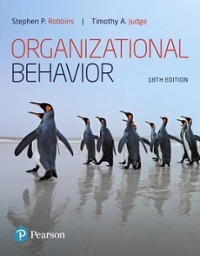Your awesome weekend has flown by and you find yourself at 8:00 p.m., Sunday evening, dreading the
Question:
Your awesome weekend has flown by and you find yourself at 8:00 p.m., Sunday evening, dreading the next day at work. You’re not alone—a 2015 poll by Monster suggests that a staggering 76 percent of employees surveyed feel depressed and full of angst Sunday evening in anticipation of work. Although people can be anxious about their work for many reasons, one major contributor can be found in whether you engage in boring or repetitive activities as part of your daily job. Feeling bored from time to time is not in itself bad, but the unethical behavior that follows may be problematic.
Recent research suggests that when one’s work is routine, more automatic, intuitive cognitive processes are activated, leading to an increase in rule-breaking behavior. On the other hand, multitasking may lead to less unethical decision making, a rare bright side for multitasking, which often results in negative outcomes like decreases in performance and attention. In a study of employees at a Japanese bank who processed mortgage applications, some employees were assigned to process only one part of the applications at a time, while others were assigned to work on more than one part of the applications. Using time card data, the researchers found that when people worked on repetitive tasks, such as examining the same part of applications at a time, they took longer lunches than were allocated to them.
Another study suggests that boredom can lead to making unethical decisions in the workplace as well. This study found that those who experience boredom in their jobs and who tend to be bored more because they perceive less stimulation from the external environment tend to engage in more CWB. Even your coworkers’ boredom can influence your own unethical behaviors. Contrary to popular perception, bored individuals do not engage in significantly more horseplay while at work. They may be more prone to engage in abusive behaviors or otherwise psychologically withdraw.
Questions
1. How do you think boredom affects your decision making, beyond promoting unethical decisions?
2. Do you think boredom can help you be more creative? Why or why not?
3. Does it surprise you that boredom was not related to horseplay? Why or why not?
Step by Step Answer:

Organizational Behavior
ISBN: 9780134729329
18th Edition
Authors: Stephen RobbinsTimothy JudgeTimothy Judge, Timothy Judge





